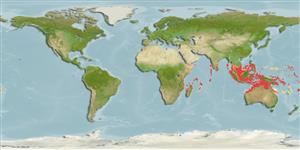>
Eupercaria/misc (Various families in series Eupercaria) >
Lethrinidae (Emperors or scavengers) > Lethrininae
Etymology: Lethrinus: Greek, lethrinia, a fish pertaining to genus Pagellus.
More on author: Smith.
Environment: milieu / climate zone / depth range / distribution range
Ekologi
laut berasosiasi dengan karang; nir-ruaya; kisaran kedalaman 5 - 220 m (Ref. 2295). Tropical; 14°N - 22°S
Indian Ocean: Tanzania, northern Madagascar, Chagos, Andamans and southwestern Indonesia.
Size / Weight / umur
Maturity: Lm ? range ? - ? cm
Max length : 76.0 cm TL jantan/; (Ref. 2295); common length : 50.0 cm TL jantan/; (Ref. 2295)
Duri punggung (Keseluruhan (total)): 10; duri punggung lunak (Keseluruhan (total)): 9; Duri dubur 3; Sirip dubur lunak: 8.
Solitarily inhabits sand, rubble, and weed areas near corals (Ref. 90102) in deep reefs. Feeds on crustaceans and small fishes. Gonads in spawning state have been observed in October. This species is not well represented in museums due to the relatively large capture size for most specimens (Ref. 2295). Also caught with handlines (Ref. 9775).
Life cycle and mating behavior
Kematangan | Reproduksi, perkembang biakan | Pemijahan | telur-telur | Fecundity | Larva
Carpenter, K.E. and G.R. Allen, 1989. FAO Species Catalogue. Vol. 9. Emperor fishes and large-eye breams of the world (family Lethrinidae). An annotated and illustrated catalogue of lethrinid species known to date. FAO Fish. Synop. 125(9):118 p. Rome: FAO. (Ref. 2295)
Status IUCN Red List (Ref. 130435)
ancaman kepada manusia
Harmless
penggunaan manusia
Perikanan: komersial
informasi lanjut
Nama-nama umumSinonim (persamaan)metabolismePemangsaEkotoksikologiReproduksi, perkembang biakanKematanganPemijahanSpawning aggregationFecunditytelur-telurpekembangan telor
AcuanBudidaya airprofil budidaya airStrainGenetikaElectrophoresesDiturunkanPenyakit-penyakitPengolahanNutrientsMass conversion
mitraGambarStamps, Coins Misc.Suara-suaraCiguateraKecepatanTipe renangArea insangOtolithsOtakPenglihatan / visi
Alat, peralatan
laporan khas
muat turun XML
Sumber internet
Estimates based on models
Preferred temperature (Ref.
123201): 23.2 - 28.3, mean 27 °C (based on 636 cells).
Phylogenetic diversity index (Ref.
82804): PD
50 = 0.5000 [Uniqueness, from 0.5 = low to 2.0 = high].
Bayesian length-weight: a=0.01514 (0.00706 - 0.03245), b=2.98 (2.81 - 3.15), in cm total length, based on LWR estimates for this Genus-body shape (Ref.
93245).
Trophic level (Ref.
69278): 4.0 ±0.67 se; based on food items.
Daya lenting (Ref.
120179): Rendah, Waktu penggandaan populasi minimum 4.5 - 14 tahun (Preliminary K or Fecundity.).
Fishing Vulnerability (Ref.
59153): Moderate to high vulnerability (50 of 100).
